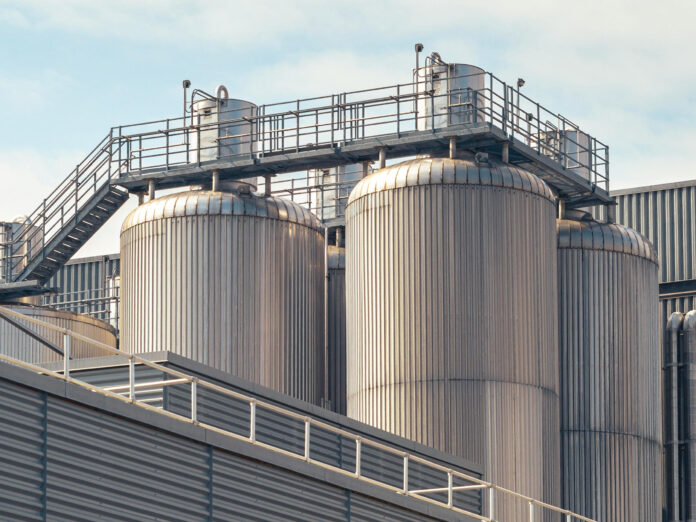
By Tyler Marshall, Regional Vice President of Manufacturing at Advantive
Key takeaways:
- Automation and ERP integration are key to overcoming labor and efficiency challenges. Food and beverage manufacturers can use ERP systems with automation add-ons to streamline operations, reduce manual errors, and maximize productivity despite workforce shortages.
- Real-time data enables smarter decisions and workforce optimization. Integrated ERP solutions give leaders visibility across production, inventory, and sales — improving demand forecasting, labor allocation, and job satisfaction while cutting waste and costs.
- Unified, compliant, and data-driven operations future-proof growth. Acting as a central command center, ERPs enhance supply chain management, ensure regulatory compliance, and create a foundation for adopting advanced technologies like AI, IoT, and sustainability tracking.
Food and beverage (F&B) manufacturers face three momentous challenges in today’s tough economic conditions: mass retirements of older workers, tightening regulations, and persistent labor shortages. These challenges restrict expansion efforts in particularly detrimental ways, leading the idea of scaling to be a distant dream for many.
In addition to hindering F&B manufacturers’ growth plans, these problems and others are taking a toll on companies’ operational efficiency and productivity. High processing costs and supply chain snags are also shrinking the margin for error, which is a tough reality given that 20% of U.S. plants are already unable to run at full capacity due to reported employee scarcity. Lack of a skilled workforce makes it hard to meet basic production demands, let alone introduce new products and initiatives to remain competitive in a crowded market. A projected shortfall of nearly 2 million manufacturing workers by 2033 indicates the issues won’t be short-lived.
Prioritizing growth and performance with a limited team is difficult, but the rising popularity of automation proves it’s not out of the question. F&B manufacturers using Enterprise Resource Planning (ERP) solutions and specialized add-ons to automate tasks are able to reduce manual data entry, planning errors, and downtime. They can scale productivity and meet rising demand with the teams they already have.
Real-time data integration delivers insights needed to boost efficiency and engagement
Modern ERP systems, integrated with automation-enhancing add-on solutions, streamline workflows from end to end. These technologies check products against customer requirements, optimize inventory levels to prevent shortages, and accelerate the entire production cycle. With the tools to create more efficient, engaging workplaces and reduce employee burnout, organizations can maintain employee satisfaction while decreasing costs and time to market.
F&B manufacturers navigating fiercely competitive markets need smarter procurement strategies, faster delivery, and accurate demand forecasting. ERP platforms and capability-boosting extensions offer the support needed by integrating real-time sales, production, and inventory data to anticipate labor and machine needs. For instance, they can call for extra line workers during seasonal beverage spikes or highlight under-or over-utilization so managers can effectively reallocate staff. These insights reduce overtime, cut waste, and improve job satisfaction.
Even as commodity prices and consumer preferences fluctuate with emerging trends, ERP-enabled scenario planning ensures organizations can adapt quickly and confidently. Research has shown that 78% of businesses that implement ERP systems report productivity increases and 61% lower costs — savings that directly bolster margins and resilience.
Unification, technology, and compliance enhance supply chain management and company growth
Beyond workforce planning, ERPs serve as the supply chain command center, consolidating procurement, order management, and warehousing into a single workflow. They break down information silos that lead to miscommunication and give manufacturers a real-time, holistic view of their operations, enabling quick responses to disruptions. Equipped with data-driven ERP insights, teams can protect production schedules and profits and still pursue growth by exploring emerging technologies, like AI, IoT-enabled quality control, and sustainability tracking.
Lenovo surveyed 600 global IT leaders and found 79% believe AI can free employees up to focus on more meaningful work — a critical advantage in food and beverage manufacturing, where tight timelines leave little room for error. Automated order processing illustrates this impact in action. Instead of relying on slow, error-prone manual entry, AI can instantly process thousands of purchase order lines and feed them into an ERP system with nearly perfect accuracy. When employees shift their attention to impactful tasks that spark innovation, operational improvements, and growth are never far behind.
Paving the way for expansion also means taking care to maintain compliance and traceability. As companies scale, strict adherence to allergen tracking regulations, FDA labeling rules, and sustainability reporting is critical to avoid dangerous and costly errors that could halt growth. Acting as a central repository for compliance data, ERPs and their integrations can generate audit-ready reports in minutes. The system helps manufacturers document, track, and report on everything from raw material sourcing and package–design specifications to waste tracking and recycling metrics. Integrating this information into a single platform streamlines the documentation process, reduces the risk of mistakes, and keeps operations compliant.
ERP software is the all-in-one solution to the age-old F&B manufacturing dilemma of how to achieve significant productivity gains without proportional staff increases. The industry’s persistent workforce shortages won’t subside any time soon, but with a platform that facilitates strategic resource allocation and more efficient workflows, companies can meet rising demand with their existing employees.
Transforming factories from mills of manual labor into data-driven operations that focus dedicated teams on high-value tasks is a necessity for F&B manufacturers, and the tools to initiate the transition are readily available. Modernizing with ERP puts food and beverage leaders in the driver’s seat so they can stay competitive and future-proof their operations against labor and regulatory pressures.
 Tyler Marshall, Regional Vice President of Manufacturing at Advantive, worked with ParityFactory of the Advantive family for over a dozen years, providing software solutions for food manufacturers. Beginning with the Alaskan Seafood industry, he has designed and successfully implemented the ParityFactory platform at operations across all food verticals from $5 million to over $1 billion in revenue, ultimately providing them millions in savings.
Tyler Marshall, Regional Vice President of Manufacturing at Advantive, worked with ParityFactory of the Advantive family for over a dozen years, providing software solutions for food manufacturers. Beginning with the Alaskan Seafood industry, he has designed and successfully implemented the ParityFactory platform at operations across all food verticals from $5 million to over $1 billion in revenue, ultimately providing them millions in savings.
Credit: Source link














